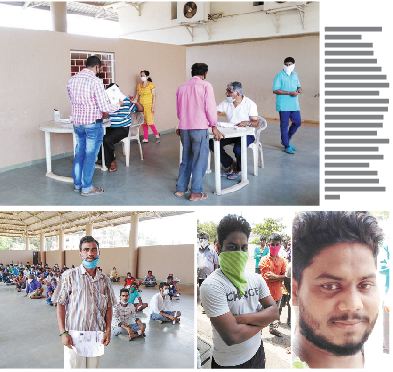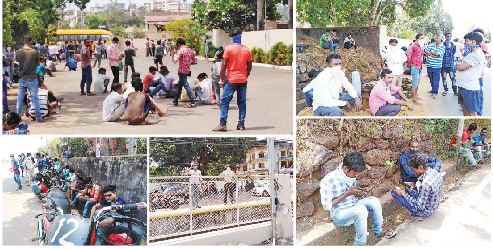Migrant workers anxious to return to their home states: Waiting to register at the Taleigao Community Hall last Saturday morning when long queues straggled along from 7am onwards… breaking queue as the heat built up to seek shelter beneath trees in the vicinity. Nothing to do but wait with or without masks on, some stayed busy with their mobile phones, some climbed the fence searching for water…
By Pankajbala R Patel
Migrant workers have had enough of Goa through 40 plus, plus days of strict lockdown and want to go back to their native places now as quickly as possible…
IT is an irony that just as Goa is putting the lockdown away into a Green Zone there are so many migrant workers impatient to go back home to their family homes in Uttar Pradesh, Bihar, Jharkhand, Maharashtra, West Bengal, the North Eastern states of Assam, Manipal, Nagaland, Manipur …the lockdown came like a sudden bolt from the blue on March 22 and soon it was fait accompli. All kinds of folk were stopped from stepping out of whatever accommodation they were staying and this impacted migrant workers most because most of them stay in rented rooms miserably tiny, sweaty holes-in-the-wall.
Add to this that their employers one after another abandoned them to their own resources with a little or without practical aid. Despite MHA guidelines dated March 24, 2020, stating that if any landlord was found forcing migrant workers to vacate rented premises would be liable for punishment, these were only sweet words from Prime Minister Narendra Modi which turned sour rapidly as after a month landlords and landladies asked their migrant guests to pay up on their rooms or the rooms would be locked to keep them out…in Calangute where there are clusters of West Bengali workers , at Betim in Pernem, Indira Nagar, Siolim, Taleigao, Vasco da Gama and most everywhere in the small wealthy state of Goa where migrants come in search of greener pastures.
At first most migrants thought it would be just a blink of an eye lockdown and what is this novel coronavirus everyone is so scared of, forcing people to wear expensive masks bought from chemists’ shops for Rs15 (disposable) to Rs50 (washable and recycled) and “yeh social distancing kya hai?” The working classes may not be able to afford masks so they strung handkerchiefs around their mouths and nose and that would have to do while they waited it out, spending whatever savings they had to eke out a living as best as they could in their digs across urban and semi-urban Goa up north or down south.
Many headed to bus and railway stations to find out that lockdown meant all interstate travelling too had come to a stunning halt. This was a real blow. Regardless of whether they had coronavirus or not they could not go home. Quickly it dawned on them that they were stuck in Goa jobless, more or less homeless…true, some help did come by way of distribution of rations courtesy North and South Collector’s offices (government of Goa) and various good Samaritan groups who managed to raise donations from right thinking Goans and went about distributing food packets to those in need at construction sites (where many workers were holed up) and across Goa at various pockets where Goan patrao rented out accommodation (rentals from Rs4,000 to Rs8,000 which were often shared between two or three workers).

One coronavirus lockdown entered another and another in three phases without a break it’s anyone’s guess how sustainable life could be over and most workers found themselves in dire straits, competing for government and whatever private aid came along along with others in dire need of sustenance such as senior citizens’ homes, orphanages, indifferent quarantine shelters for those without home and food. Soon social media was rife with messages swinging back and forth about how many were busy collecting donations to rush to the rescue of migrant groups here and there without food and water, the needy sick and old; almost overnight good Samaritan ventures cropped up with live kitchens and even charitable church and temple premises coming alive with the distribution of food and daily essentials so that nobody starved to death.
Who would believe that there are so many migrants from the country over working in Goa? By one estimate Goan industrial estates and businesses run on oiled wheels courtesy a migrant work force of three to four lakh. A recent report has it that ever since the lockdown eased out April-end with Goa being declared a Green Zone as far as coronavirus infection was concerned (with no positive cases or if there were they were too few to count and could be dismissed as COPD pneumonia deaths!), Minister of Ports Michael Lobo announced that measures would be taken to transport “25,000 migrants stranded in the Calangute constituency.”
Calangute constituency is Minister Michael Lobo’s fiefdom where migrants have always been welcome to work in beach shacks, hotels, beauty parlors and other areas where Goans think manual jobs are not worth their while to earn small money. There was a catch of course and it soon became clear, the workers were out of money and had little money left to pay for a bus or train ride back to their home states. With the relaxation of the coronavirus lockdown many migrant had heaved a sigh of relief, now they could go home and the government would be their true Big Brother.
And so began the rush to register at various Panchayat premises such as the Taleigao Panchayat for migrants in the neighborhood. Here one saw long queues from 7am onwards on Saturday, April 25. Out of the estimated 3.3 to 4 lakh migrants in Goa some 8,000 had already registered even as Chief Minister Pramod Sawant appealed to the workers not to go since business was opening up on the industrial, construction, market, mining fronts – stay back and there would be both work and money for them! Well, Goa has its own story to tell about the good life.
AS the morning heat built up the serpentine queue outside the Taleigaon Community Hall grew and workers broke up in groups to seek coolness under the trees nearby, a lone watchman letting them in in lots and at times running out of patients when anyone insisted in getting it for the only water tap offering cooling water was inside the compound. There must have been an estimated 200 to 300 migrant workers in the queue in fits and starts, most perspiring in the heat and wondering when some friendly offers of food and drink would come their way, one of them said, “Those who were first in the queue got some nashta but that was just for show, most of us didn’t get it, now we are tired in the queue for three hours and can you do anything to get us something?”
Why are anxious to go back to your home states? The usual answers. A Dilip Kumar from Devaria Zilla in Uttar Pradesh said, “I’ve been working in Goa as a carpenter for three years, making about Rs15,000 income , paying Rs3,000 for shared rental accommodation at Caranzalen. Back home we are nine in the family…if I go home at least my family will feed me!” Here all his money had run out and their landlord was saying, no rent, no stay. Yes, most employers had their own limitations in supporting unemployed migrant workers. At least at home in their village their parents and family would feed them even if reluctantly since they had come back without any money!
When queried about government aid which many had got, one of the works said, “Soona hai magar hum ko kuch nahi mila, hum toh zeb se karach te hai…” (We heard about it but we didn’t get anything, we are spending out of our own pocket.) About 70% of them are from Uttar Pradesh here, one understands. Kishore Devbhare from Nagpur said a group of them worked at the Cidade da Goa’s new hotel but “and they were good to us but still we cannot stay now, for we are 15 or so staying in rooms at Dona Paula, four to five of us to a room…I am missing my family and my family is worried about me, they want to send me money to go home but don’t know how to send the money!”
From the sound of while many migrant workers got some aid by way of rations being distributed by government agencies, much of it was very arbitrarily distributed and sometimes to the same people standing in queues…many more didn’t even get to hear about the distribution of free rations or even cooked food. In any case with no public transport and the distances entailed would have made it difficult for them to go somewhere far away to stand in a queue to get whatever was distributed free. It was too much trouble and oftentimes for too little! So they stayed incarcerated in their rented premises during the entire lockout period, going out to buy some veggies and rations at their own expense….
Under the circumstances is it any surprise that many of the migrant workers in Goa want to return to their home states first before thinking of coming back! Perhaps on better terms this time. Funny or not funny, most of them find it hard to believe that while the Indian government is stretching itself to facilitate rich Indians stranded abroad to get back to their homes in India, various political parties and chiefly the BJP and Congress are squabbling about how much to charge the country’s poor hardworking true blue aam aadmi Indians to get to their humble homes safe and sound!
Such are the ironies of governance in a country which has long since missed the boat of development for the many, for the continuing expenditure of spending lavishly on khaas aadmi friends and their comforts and luxuries.
